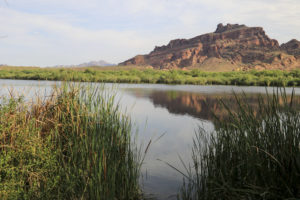
The final “Waters of the United States” rule conflicts with the plain text and purpose of the Clean Water Act and disregards judicial precedent, according to the complaint.
Washington, DC — The Environmental Integrity Project, representing four other environmental groups, today filed a complaint asking the U.S. District Court for the District of Columbia to vacate EPA’s rewritten “Waters of the U.S.” rule — known as the Navigable Waters Protection rule — because it is “arbitrary, capricious, and otherwise not in accordance with law.”
The June 22, 2020, rule seeks to substantially revise the meaning of the term “waters of the United States” (WOTUS) as defined under the Clean Water Act (CWA), and in doing so, exclude waters long understood to fall within the Act’s protections. It rolls back federal oversight of up to half the country’s wetlands and around a sixth of its streams—specifically ephemeral streams that only flow after rain or snowfall—many of which have been protected for decades. The health of these water bodies is often critical to maintaining local ecosystems and important biodiversity habitat. They also function as natural filtration systems when not suffering from over-pollution, as well as treasured spots for outdoor recreation.
According to the complaint, the final WOTUS definition, “not only conflicts with the plain text and purpose of the CWA, defeats a central purpose of the CWA, and disregards judicial precedent, established science, and the agencies’ prior factual findings and longstanding policies and practices, but does so without any rational, let alone ‘reasonable’ explanation.” The plaintiffs include the Environmental Integrity Project, Food & Water Watch, Patuxent Riverkeeper, the Lower Susquehanna Riverkeeper Association, and the Gunpowder Riverkeeper.
“The Trump EPA’s definition of waters protected under the Clean Water Act not only goes against a commonsense reading of the law, but also against the accepted science of how water bodies become polluted,” said Sunny Lee, an attorney with the Environmental Integrity Project. “With this legal action we hope to reveal, once again, the extent to which this administration is rolling back critical environmental regulations at the expense of public health simply so industry can save a few dollars cutting corners.”
“The WOTUS rule is no different than so many of this administration’s sloppy and unjustifiable actions: it disregards science, public health, and the environment at every turn,” said Tarah Heinzen, senior attorney at Food & Water Watch. “The rule is yet another example of the Trump Administration currying favor with Big Ag and other polluters, and we expect the courts will correctly determine it to be illegal.”
The agencies adopted the final rule over the sustained objections of the agencies’ own experts and EPA’s Science Advisory Board, whose comments on the 2019 proposed rule stated that the agencies’ new WOTUS definition would likely result in unjustified new risks to human and environmental health.
For instance, the final rule categorically excludes any upstream waters connected to protected waters through belowground hydrological links—including wetlands sharing a shallow underground connection with protected waters. Under the final rule, only wetlands that share a direct surface water connection with protected waters are considered “waters of the United States.”
The final rule also eliminates “interstate” waters as a category, excluding many waters that cross state borders, and that EPA has expressly interpreted as subject to CWA protections since its enactment.
“The 2015 Clean Water Rule was driven by science-based discoveries and conclusions to further protect the public, the environment and our water,” said Lower Susquehanna Riverkeeper Ted Evgeniadis. “This rollback is a direct attack on the hardworking people of the United States who treasure our outdoor spaces and the future generations who will be robbed of the natural, historic and aesthetic values of their environment.”
“If the new WOTUS rule is left unchallenged, numerous critical wetlands in the Gunpowder watershed will lose protection under the Clean Water Act,” said Gunpowder Riverkeeper Theaux Le Gardeur. “Without these protections, important ecological features and natural stormwater controls will be greatly jeopardized.”
“The final WOTUS rule is a totally misguided and insidious attempt to redefine how water bodies across the country are protected,” said Patuxent Riverkeeper Frederick Tutman. “At a time when we should be prioritizing clean water and healthy aquatic ecosystems, Trump’s EPA is instead undermining those very goals for the sake of rapid, unchecked growth.”
Download the complaint here.
The Environmental Integrity Project is a nonprofit, nonpartisan organization, based in Washington D.C., that protects public health and the environment by investigating polluters, holding them accountable under the law, and strengthening public policy.
Food & Water Watch mobilizes regular people to build political power to move bold & uncompromised solutions to the most pressing food, water, and climate problems of our time. F&WW works to protect people’s health, communities, and democracy from the growing destructive power of the most powerful economic interests.
Patuxent Riverkeeper is a nonprofit watershed advocacy organization affiliated with the Waterkeeper Alliance in New York, an umbrella group that licenses and links Waterkeepers internationally. The sole purpose of the Patuxent Riverkeeper is to protect, restore, and advocate for clean water in the Patuxent River and its connected ecosystem.
The Lower Susquehanna Riverkeeper Association is a non-profit watershed association dedicated to improving the ecological health of the Lower Susquehanna River Watershed and the Chesapeake Bay. The Lower Susquehanna Riverkeeper patrols the river for illegal pollution, and when necessary, enforces environmental laws to protect the river and communities that depend on it.
Gunpowder Riverkeeper is a grassroots, advocacy based membership organization charged with protecting, conserving and restoring the Gunpowder River and its Watershed.
Media contacts:
Ari Phillips, Environmental Integrity Project, aphillips@environmentalintegrity.org, (202) 263-4456
Ted Evgeniadis, Lower Susquehanna Riverkeeper, lowsusriver@hotmail.com, (609) 571-5278
Frederick Tutman, Patuxent Riverkeeper, fred@paxriverkeeper.org, (202) 683-2457
Tarah Heinzen, Food & Water Watch, theinzen@fwwatch.org, (612) 296-0994
Theaux Le Gardeur, Gunpowderriverkeeper@gmail.com


